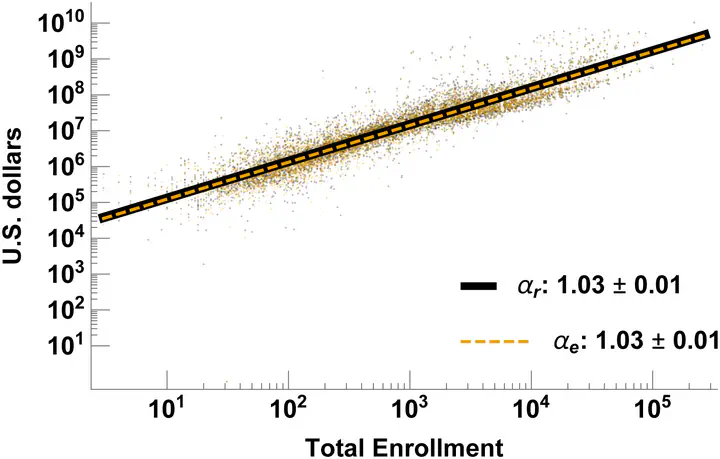 University scaling behavior
University scaling behaviorInspired by the city scaling research by Geoffrey West and Luis Benttencourt, I joined Ryan Talyor (another undergraduate student) at Santa Fe Institute (SFI) to examine the scaling behaviors of universities for 2017 and 2018 summers. Biology research has shown that scaling effects govern the fundamental laws of organisms, including animals, cities, and businesses. University as a special class of organism is highly modulated by human interventions. Will they follow the scaling law? If so, how do they tradeoff their production and maintenance functions?
To tackle the question of scaling in higher education, the SFI team, which also included Chris Kempes, Marion Dumas, Geoffrey West, and Manfred Laubichler, divided institutions into categories, such as for-profit colleges, community colleges, private research universities, and public research universities.
We show that, like organisms, ecosystems and cities, universities and colleges scale in a surprisingly systematic fashion following simple power-law behavior. Comparing seven commonly accepted sectors of higher education organizations, we find distinct regimes of scaling between a school’s total enrollment and its expenditures, revenues, graduation rates and economic added value. Our results quantify how each sector leverages specific economies of scale to address distinct priorities. Taken together, the scaling of features within a sector along with the shifts in scaling across sectors implies that there are generic mechanisms and con- straints shared by all sectors, which lead to tradeoffs between their different societal func- tions and roles. We highlight the strong complementarity between public and private research universities, and community and state colleges, that all display superlinear returns to scale. In contrast to the scaling of biological systems, our results highlight that much of the observed scaling behavior is modulated by the particular strategies of organizations rather than an immutable set of constraints.